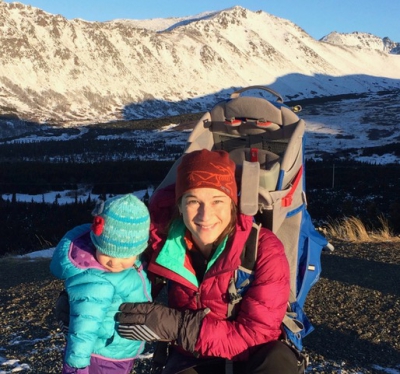
Audrey Taylor serves as the Treasurer for ARCUS. She is also the Chair of the Education Committee and a member of the Membership Committee. She joined the Board of Directors in 2014 and her term ends in 2017.
In her "real" job, Audrey is an Assistant Professor of Environmental Studies at the University of Alaska Anchorage. She was trained as an Arctic avian ecologist and earned a PhD from the University of Alaska Fairbanks, but her current projects include a variety of species and habitats. She has graduate students studying nesting loon responses to human disturbance on Alaska's North Slope, the effects of a water temperature and invasive macrophyte gradient on waterbird distributions on the Copper River Delta, and how wetland and landscape-scale habitat features influence distribution of boreal wetland birds in southcentral Alaska. She also maintains a long-standing citizen science project observing declining boreal bird species in Anchorage, and a tree swallow monitoring project that is part of the Alaska Swallow Monitoring Network on Joint Base Elmendorf Richardson.
Audrey was originally drawn to working in the Arctic through her interest in shorebirds, which breed in vast numbers on the tundra of northern Alaska. Over time she has recognized the need for a greater understanding of the complex linkages between manifestations of physical climate change and the biological responses that affect wildlife populations and the humans that depend on them. These multi-trophic level interactions can only be deciphered through an integrated, cross-disciplinary Arctic research program, such as that sought by ARCUS and its member institutions. In addition, Audrey would like to see greater utilization of citizen science and community-based monitoring programs in the Arctic, especially in Arctic tourism settings, to foster information-gathering capability in remote areas as well as the integration of multiple knowledge systems, such as traditional and Indigenous knowledge and Western science, for example.
From Audrey's perspective, being on the ARCUS Board has been a tremendously positive experience because ARCUS plays a unique role in advancing a vision for collaborative, interdisciplinary Arctic research and outreach. By bringing disparate individuals and institutions together and providing a venue for disseminating knowledge of all types, ARCUS has been instrumental in promoting the development of truly integrated Arctic research and education programs. In particular, Audrey looks forward to seeing the Education Committee develop its goals for encouraging citizen science and community-based monitoring efforts in the near-term by co-hosting a session on Polar Tourism and Citizen Science at the upcoming POLAR2018 conference in Switzerland next June.
